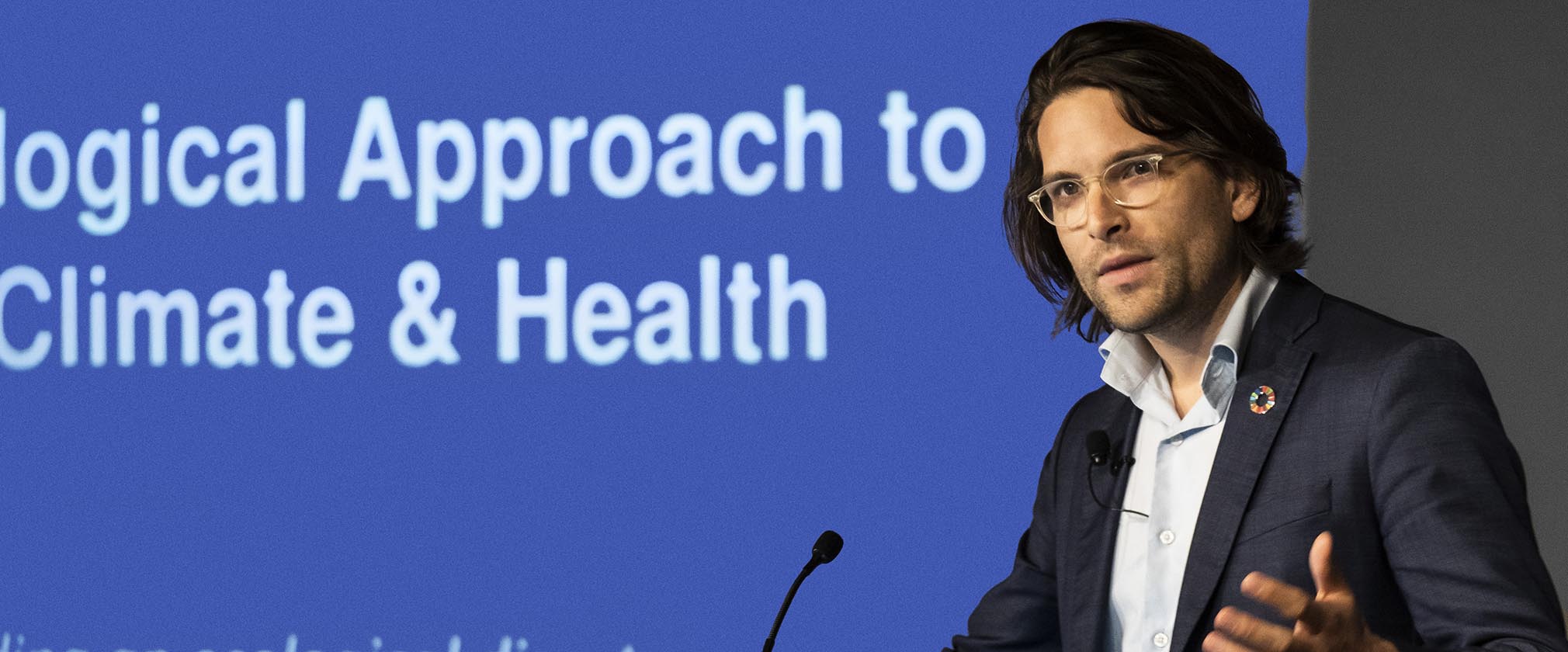Energize: An Ecological Approach to Growing a Food, Climate & Health Movement
The Center for A Livable Future Polly Walker Ecology Fund
October 23, 2019

Fix it with Food: Creating a Movement
BALTIMORE—Oct. 23, 2019. “There are no known solutions,” said Alessandro Demaio, referring to the suite of threats facing the planet and humanity. “Scaling the solutions we already have is not going to work.”
The point of his talk, delivered at the Bloomberg School, was that we need to find new solutions. It will be hard work that requires a lot of people to roll up their sleeves and collaborate on overlapping goals and tactics.
“There will be no silver bullet,” he said. Instead, we’ll need a network of solutions, woven together from many different sectors—academia, advocacy, industry—in many different forms.
Alessandro Demaio, MD, presented his ideas for how to take an ecological approach to solving ecological disaster, as a guest of the Johns Hopkins Center for a Livable Future’s 7th Polly Walker Ecology Fund lecture. Demaio is a former medical officer with the World Health Organization, the former chief executive of EAT, a science-based, global platform for food systems transformation, and is the new Chief Executive Officer of the Australia-based Victorian Health Promotion Foundation (VicHealth).
An ecological disaster is unfolding, he says—as well as a health disaster. Some of the most grave threats he was referring to are chronic disease, climate change and social isolation.
“The world has never been richer,” he says, “but half the world is malnourished.”
Conflict and climate change are two main drivers of global malnutrition, while further undermining food systems around the world—and at the same time, food systems are a major driver of the causes of conflict and climate change, such as freshwater depletion, loss of soil, deforestation and eutrophication. The feedback loop is daunting.
On top of that, Demaio says, political and economic situations around the world have become toxic, almost impossible to navigate. But with food systems at the center of rapidly escalating challenges, reforming the food system might be the best path toward solutions that work simultaneously on a number of problems. Food, he says, could be the Trojan horse that allows us to address one, concrete problem at a time, while also quietly tackling more abstract problems that are harder to rally public support for.
“If we can get it right for food, we can get it right for people and planet,” he says.
The barriers? Inertia and apathy, he says, which are a result of the current political and economic situations that are so difficult to navigate. The answer? A movement.
“How do we create a mass calling, a mobilization, to get an evidence-based, ecological movement going?” he asks.
His suggestions for creating a movement include everyone who’s working toward food system reform getting better at connecting the dots, in language that resonates with the people we’re trying to reach. If, for example, language grounded in humanitarian and moral ideas does not resonate, then perhaps we must use language grounded in security and safety. Continual iteration, engaging new platforms and generations is another suggestion. “What works today may not work tomorrow,” he says.
Perhaps his boldest suggestion—for a talk at a school that educates the next generation of public health researchers and practitioners—was a plea to scientists to stay humble, and to not overestimate the impact of science. To create a movement, he says, we must arrive at an understanding that published scientific papers are necessary, but not sufficient. “Published science alone will not save us,” he says. Scientists, he says, must “sideline our egos and get out of the echo chamber.”
Demaio hosts a weekly television, Ask the Doctor, that airs weekly in Australia and is available globally on Netflix. Next year, his foundation, the Sandro Demaio Foundation, will launch an accelerator program that supports eight startups working to improve health and tackle chronic disease through food.
Read a Q&A with Alessandro Demaio on Externalities, or the True Cost of Food.
—Christine Grillo